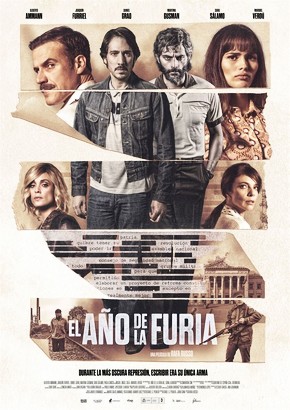
THE YEAR OF FURY/ L’ANO DE LA FURIA
Spain/Uruguay, 2020, 99 minutes, Colour.
Alberto Ammann, Joaquin Furriel, Daniel Grao, Martina Gusman, Sara Salamo, Paula Cancio, Maribel Verdu.
Directed by Rafa Russo.
The 1960s to the 1980s were decades, especially in Latin America, of social upheaval, political unrest, military coups, dictatorships. Audiences are more familiar with those in Chile with the death of President Allende in 1973 and the subsequent rule of General Pinochet, as well as the history of Argentina, the rule of the Generals and the Falklands war.
This film is about Uruguay, a smaller country, not so well-known. And it takes place in 1972, an atmosphere of military rule, then a move towards a coup d’état and a dictatorship. It has been written and directed by Rafa Russo (The Movieteller).
The film shows the steely intent of the authorities, high righteous ideology, with some religious background, and, with one of the central characters, a man who tortures, trained in the School of America techniques, playing music while he tortures, but his own character tortured, militarily ambitious, agreeing with the ideology, distant from his wife, and then taking up with a prostitute who, in fact, has been chosen by the authorities for him. The key aspect of the drama is his relationship with her, the authorities deciding his relationship is too much and shooting her – but her survival, her pregnancy, his shielding her, exposure, her death – and the fate of the new born baby.
The rebels are also shown, initially in the torture chamber and the news of the deaths. And the focus of the film is on two writers of television satire, one of them with a harsh past, a celebrated novelist, but arrested, bound and executioners firing around him but not at him to intimidate him. The other writer is very earnest, introduced into the group of rebels, but also very friendly with and caring for the pregnant prostitute.
There are no winners in this situation, some rebels fleeing to Argentina, others arrested, pursued and killed, and the central writer forced to stand up for his conscience.
Audience knowledge of Uruguay and politics, the 1970s, dictatorships?
South American of the period, Chile and President Allende, the 1973 uprisings and dictatorships? The experiences in Argentina? As background for this story?
The visuals of Uruguay, the city, the views, homes, the streets, the television studios, the meetings of rebels, the military, the prisons, the torture chambers, hotels and rendezvous? The musical score?
Elaboration of the political situation, the role of the military, the role of the political leaders, the move towards pressure and repression, arrests, torture, rebels and their being spied on, atmosphere of fear?
The focus on Diego and Leonardo, their writing satire, the performances, the studio response, the studio chiefs, the political implications? The success? Under suspicion? The pressure on the studio heads, rewriting the satires? The reaction of the actors, Leonardo and his anger? Diego and his disillusionment?
Diego, the focal character, the situation through his eyes, a good man, his friendships, with Jenny and Emilia, his friendship with Susana, in all her troubles, supporting her? The friendship with Leonardo, his background, author, stopped in the street for autograph, his moving on, memories of his arrest, the threats, blindfolded and the shots, the warning and his subsequent life, drinking, women, the past relationship with Emilia? The writing, anonymous, having to change the screenplay? Diego, anger, the falling out between them? The later reuniting, Leonardo and his explanations?
Emilia, the family, the relationships with the men? Jenny, the relationship with Sergio, in the house, his being tortured, the news of his death, hiding his things, the search of the house? Emilia and Leonardo? Jenny and her involving Diego, the meeting with the groups, the information about Rojas, the consequences?
The atmosphere of the torture, Rojas and his putting on the music, Sergio and the torture, the later news of the deaths of the prisoners?Trained by the Americans in Panama, School of the Americas, torture skills, yet playing the music? The tense relationship with his wife? The meeting with Susana, seeing her at home, preparation to go on the streets, the blonde wig, with Rojas, the military picking her?
The relationship with Rojas and Susana, her being pregnant, his visits, his violence, yet his tenderness towards her, the secret police their watching him, the threats, shooting Susana, her recovery, his getting the apartment for her? Her secrecy, but her telling Diego, his telling the contacts, the following Rojas, the secret police following them, and shooting the pursuers dead?
The birth of the baby, Diego helping, Rojas taking the baby and giving it to his wife?
The buildup to a coup, the subsequent history Uruguay, refugees fleeing to Argentina, Leonardo and his future, Diego and his place in society?
A grim reminder of political situations 50 years later?
